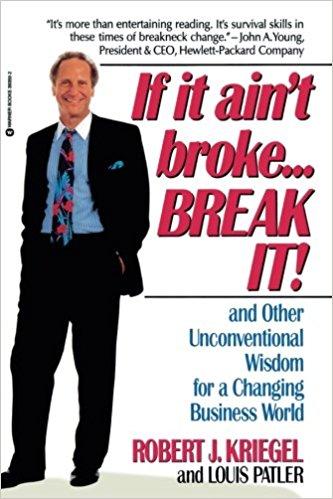If It Ain’t Broke…Break It! Summary
3 min read ⌚
 And Other Unconventional Wisdom for a Changing Business World
And Other Unconventional Wisdom for a Changing Business World
“If It Ain’t Broke… Break It!” tells you why accepting change is the only way you can get ahead.
About Robert J. Kriegel and Louis Patler
 Robert J. Kriegel, Ph.D., is an author, a former athlete, and former marketing and advertising executive.
Robert J. Kriegel, Ph.D., is an author, a former athlete, and former marketing and advertising executive.
Louis Patler is a speaker and an award-winning author, now president of the B.I.T. Group, based in Marin County, California.
“If It Ain’t Broke…Break It! Summary”
Change happens all the time, in all areas of life and business.
However, as it always happens unexpectedly and rapidly, it can even shake up the most secure companies.
So, for a business to survive, it must embrace what everyone fears: change and transformation.
Conventional wisdom will no longer help you. It was never that successful in the first place, but in today’s environment it is more than no longer working – it is entirely outdated.
For example, according to conventional wisdom, you should play safe.
However, we all know that without taking risks you will always be close to failure. When you are too busy trying to keep your company survives, it will never truly live.
Unconventional wisdom, on the other hand, will keep your company innovative and actively growing.
And you need to grow since if you do not, someone else will capitalize on your stagnation.
You need to fully comprehend the idea that everything is continually changing, and when you do, you will get why there is no such thing as a “finished” product.
There is a Japanese word for this: kaizen, which means continuous improvement.
The process of kaizen, or improvement, starts with “the acceptance that the status quo is not perfect.”
Your products and services have to follow the rhythm of the environment.
Yes, there are times when changing the product is not the wisest thing to do, but even then, you have to adapt to the evolution of your environment by adjusting the marketing.
Business should never be satisfied with what they accomplish – they should always strive to do better the next time and try to improve in every area.
We understand that change can be scary, and making bold decisions as well, but taking the conservative approach is exhausting, and even though it feels safe, it is not secure.
The only way you could make a terrible decision is fearing to make a decision.
Key Lessons from “If It Ain’t Broke…Break It!”
1. Change the Game
2. Killing Sacred Cows
3. Face Your Fears
Change the Game
If you do not think the market you are in is enough, change the game. Define your own market, create one for yourself, even though it may not have existed previously.
Instead of trying to fit in, shape the external environment according to your wishes.
Killing Sacred Cows
Sacred cows are those things that we do not know why we do in a certain way, but we have always done it like that, so we just continue to do so.
People fear to change such processes, and because of this fear, these standard operating procedures become sacred to everyone.
What sacred cows do, however, is keeping you in your status quo.
Get rid of them and start reacting to changes, without being tied down to a routine you are afraid to break.
Face Your Fears
Fear keeps people stuck in their problems, and stops them from pursuing their dreams. Most of the stress people experience is caused by fear as well.
Find a way to deal with fear and do not let it get in your way.
Like this summary? We’d Like to invite you to download our free 12 min app, for more amazing summaries and audiobooks.
“If It Ain’t Broke…Break It!” Quotes
Competition encourages conformity, so break the rules and change the game. Share on X The time to change is when you don’t have to; when you’re on the crest of the wave, not when you ’re on the trough. Share on X The rules for catching and riding a wave are fairly simple. The challenge is to turn them into action. Share on X The thing that makes the difference between a good manager and an inspiring, dynamic leader goes beyond competence. It’s passion. Share on X The most common reaction to change is resistance. Share on X
Emir is the Head of Marketing at 12min. In his spare time, he loves to meditate and play soccer.






